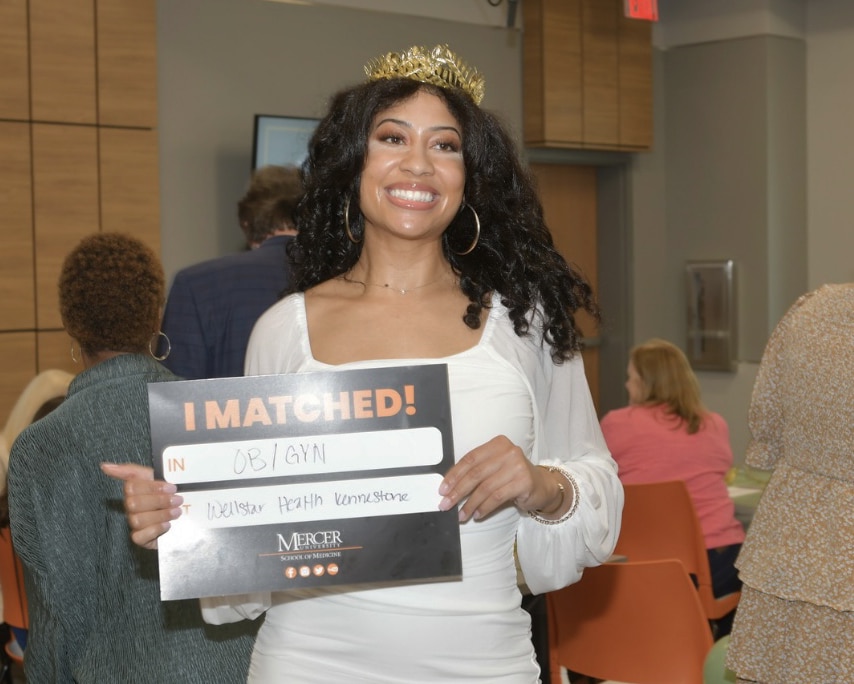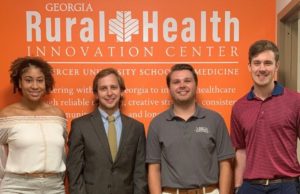
By Kayla Stroud, Communications and Events Specialist
The Georgia Rural Health Innovation Center (GRHIC) is preparing to usher in its fourth cohort of second-year medical students for a summer of the Maternal Health Observership program.
Mercer University School of Medicine (MUSM) student Alicia Williams (’24) inspired the idea for the observership program in 2020 as a way to offer a summer internship with an obstetrics and gynecology focus.
“I started surveying people, surveying the climate — just asking to see if this was something Mercer could do. I ultimately did get a meeting set up with Dean Sumner, and I prepared a PowerPoint showing her all these great things that bring more awareness to maternal health challenges in rural Georgia,” said Williams.
Williams credits GRHIC and Jean Sumner, M.D., FACP, dean of MUSM, for the quick response and for listening to her interests in maternal health in rural communities. “The whole process felt like a whirlwind because two months later, GRHIC announced that it was launching a Maternal Health Observership and taking applications for the first cohort.”
“I think the effort from the GRHIC staff, along with Dean Sumner, speaks to Mercer’s character as an institution,” said Williams. “To do something that grand in such a short amount of time speaks to the people who support Mercer and want the best for their medical students.”
The observership offers medical students interested in obstetrics and gynecology an expanded learning experience in rural, medically underserved communities. For six weeks, students shadow physicians in rural Georgia and participate in a specialized curriculum in their field.
Williams said participating in the program was a beneficial learning experience, citing the chance to shadow the attending physicians, spend time in their private practice, meet their patients, and build relationships with them. Williams’ favorite memories from the experience were the opportunities to interact with patients, the experience as a whole, and the family that she gained throughout the process.

“Learning and getting hands-on experience in the field of OB-GYN early in my medical education sealed the deal about doing this as a career. Even after I left the program, the physicians who taught me that summer always followed up,” said Williams. “They’d always ask: ‘Hey, how did your test go?’, ‘How are rotations going?’ or ‘Are you still interested in OB-GYN?’ Even when it came time for the match: ‘What letters do you need?’, ‘How can we help you be successful?’ It was constant support and reassurance. It felt like I had a family who wanted me to accomplish my goals and be who I wanted to be.”
Kedrick Williams, DHA, MPH, senior rural health project manager and observership coordinator, noted the significant growth the program has experienced over the last four years and recognizes Alicia Williams’ vital role in the program’s development.
“The summer program has grown in student outreach regarding the number of students recruited to participate and the number of schools represented,” said Dr. Williams. “In addition to the clinical areas that students have the opportunity to be exposed to across rural Georgia, we have more sites and a greater variety of clinical sites,”
The program will welcome students from MUSM and Morehouse School of Medicine on June 17 for the six-week program. Among the activities, participants will shadow maternal health care providers in rural areas, complete problem-analysis research projects, view documentaries highlighting maternal health disparities and more.
Williams matched with Wellstar Kennestone Regional Medical Center’s OB-GYN residency program in Marietta. She leaves this advice for the incoming cohort: “Be extremely open to learning, have a great attitude, be ready to ask all the questions that you can, really show your interest and find your passion, find what you’re curious about, and try to relate to all of your experience that you gain over your six weeks. And be ready for anything.”
